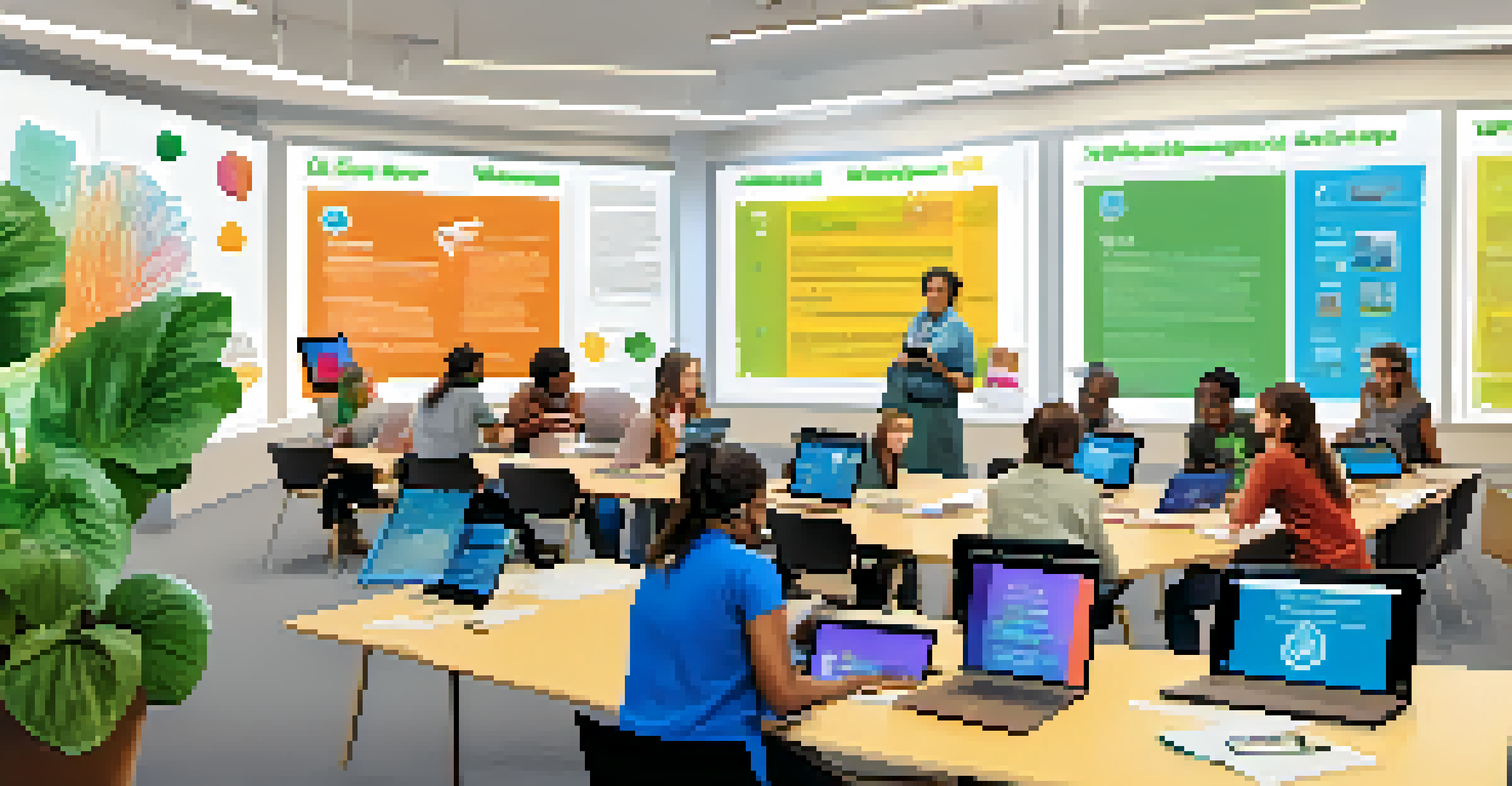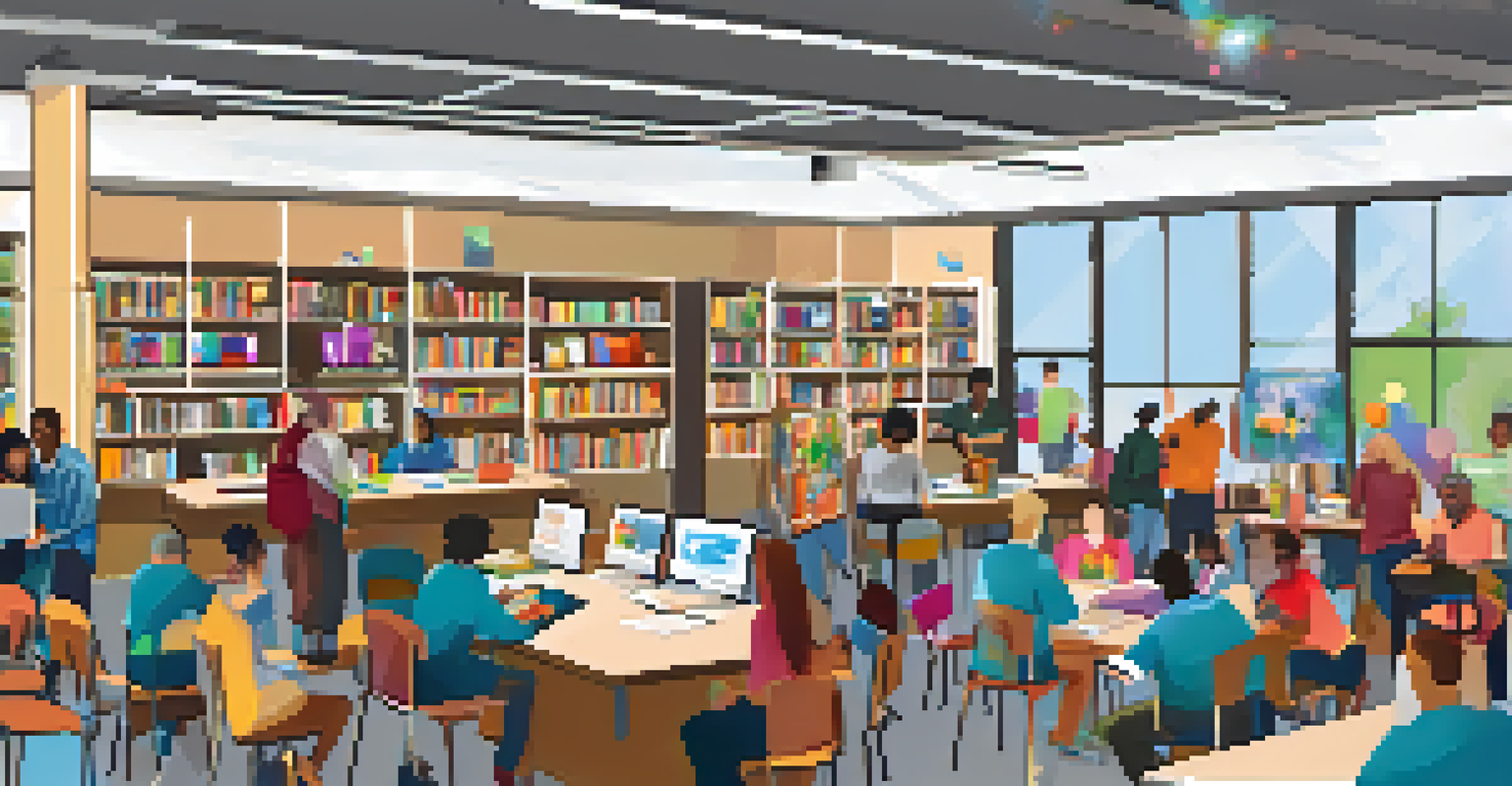The Role of Libraries in Promoting Digital Access to Education

Understanding Libraries' Evolving Role in Education
Libraries have long been known as bastions of knowledge, but their role has evolved dramatically in the digital age. Today, they not only house books but also provide crucial access to digital resources. This shift is essential as education increasingly relies on technology, making libraries vital in bridging the digital divide.
Libraries are not just about books; they are about building communities and providing access to information for all.
By offering internet access, computers, and digital literacy programs, libraries are transforming into community hubs for learning. For many individuals, especially in underserved areas, libraries are often the only place where they can access the internet and educational resources. This makes them indispensable in promoting equal opportunities for all learners.
Moreover, libraries are not just passive providers of information; they actively curate and facilitate access to educational content. Through partnerships with educational institutions, they create platforms for online courses and resources, helping to foster a culture of continuous learning. This dynamic role highlights just how pivotal libraries are in ensuring everyone has the tools they need to succeed.
Digital Literacy Programs: Empowering Communities
Digital literacy is more important than ever, and libraries are stepping up to fill this gap through targeted programs. These initiatives teach individuals how to navigate digital tools, from basic computer skills to more advanced online research techniques. By equipping people with these skills, libraries empower them to access educational resources more effectively.

For example, many libraries offer workshops that guide participants through using online databases, navigating educational websites, and understanding digital privacy. These sessions can be life-changing, providing participants with confidence and competence in their digital skills. As a result, they become better equipped to pursue educational opportunities that were previously out of reach.
Libraries as Digital Learning Hubs
Libraries are transforming into community centers that provide essential digital resources and literacy programs to bridge the educational divide.
Additionally, libraries often tailor their programs to the specific needs of their communities, ensuring that the training provided is relevant and impactful. This personalized approach not only boosts educational access but also fosters a sense of belonging and community engagement. Ultimately, these digital literacy programs are essential in creating informed citizens who can thrive in an increasingly digital world.
Access to Online Resources: A Lifeline for Students
Libraries serve as critical access points to a wealth of online educational resources. From e-books and academic journals to online courses and research databases, the digital offerings available through libraries are vast and varied. This makes them invaluable for students who may not have the means to access these resources elsewhere.
The best way to predict the future is to create it.
For instance, a student working on a research paper can log into their local library’s website and gain access to subscription-based academic databases at no cost. This level of access can significantly enhance the quality of their work and overall learning experience. It also levels the playing field, providing all students, regardless of their socioeconomic status, the opportunity to excel academically.
Moreover, libraries curate these digital resources to ensure they are relevant and reliable. Librarians often assist in guiding users to appropriate materials, making the research process more efficient. This support not only helps students find what they need but also fosters a love of learning and inquiry.
Connecting Communities: Libraries as Digital Hubs
In addition to offering resources, libraries are essential in connecting communities through digital access. They create safe spaces where individuals can gather, learn, and collaborate on educational projects. This sense of community is vital, particularly in an age where digital isolation is commonplace.
Libraries often host events, workshops, and classes that bring people together to explore new technologies and educational opportunities. These gatherings can spark collaborations that lead to innovative projects and lifelong friendships. By fostering such connections, libraries enhance not only educational access but also community cohesion.
Empowering through Digital Literacy
Targeted digital literacy programs in libraries equip individuals with vital skills, fostering confidence and enabling greater access to educational resources.
Furthermore, libraries serve as conduits for information sharing, helping to connect individuals with local organizations and resources that can further enhance their educational pursuits. This network of support creates a more informed and engaged community, reinforcing the library's role as a vital educational institution.
Partnerships with Educational Institutions
Libraries increasingly partner with schools, colleges, and universities to enhance educational access. These collaborations can take many forms, from sharing resources to co-hosting events and workshops. Such partnerships are instrumental in creating a seamless learning experience for students.
For example, many libraries collaborate with local schools to provide supplemental resources for students. This might include after-school programs where students can receive tutoring or access online educational materials in a supportive environment. These partnerships not only enhance learning but also help bridge the gap between formal and informal education.
Furthermore, these collaborations often lead to the development of unique educational programs tailored to community needs. By working together, libraries and educational institutions can create innovative solutions that address specific challenges faced by learners. This synergy ultimately enriches the educational landscape and fosters a culture of lifelong learning.
The Role of Libraries in Supporting Lifelong Learning
Libraries play a crucial role in promoting lifelong learning by providing ongoing educational opportunities for all ages. They offer a variety of programs, including workshops, lectures, and online courses that cater to diverse interests. This commitment to lifelong learning helps individuals adapt to the ever-changing demands of the workforce and society.
For instance, many libraries have embraced online learning platforms that allow patrons to take courses at their own pace. Whether someone is looking to learn a new language, improve their coding skills, or explore a new hobby, libraries provide the resources needed to pursue these interests. This flexibility makes education more accessible and appealing to a broader audience.
Community Connections and Partnerships
Libraries enhance educational access through partnerships with schools and local organizations, creating collaborative learning environments for all.
Additionally, libraries often host events that bring together community members to explore topics of interest, fostering a culture of curiosity and engagement. This approach not only enhances individual knowledge but also strengthens community bonds. In this way, libraries are essential in creating a society that values and supports continuous learning.
Challenges and Opportunities Ahead for Libraries
Despite their vital role in promoting digital access to education, libraries face several challenges in the modern landscape. Budget cuts, reduced staffing, and the rapid evolution of technology can hinder their ability to provide services effectively. However, these challenges also present opportunities for libraries to innovate and adapt to changing needs.
For instance, many libraries are exploring new funding models, such as grants and community partnerships, to sustain their operations. By diversifying their funding sources, they can continue to provide essential resources and programs that support education. Additionally, libraries are increasingly leveraging technology to enhance their services, creating more engaging and interactive learning experiences.

Furthermore, as communities become more aware of the importance of libraries, there is potential for increased advocacy and support. By showcasing the impact they have on education and community development, libraries can rally public support to ensure their continued relevance and success. The future of libraries as educational powerhouses looks promising, provided they can navigate these challenges with creativity and resilience.